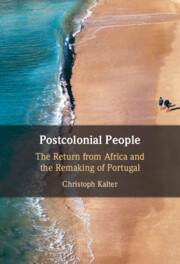Crossref Citations
This Book has been
cited by the following publications. This list is generated based on data provided by Crossref.
Peralta, Elsa
and
Góis, Bruno
2022.
Os Inseparáveis da Huíla: comemoração e nostalgia colonial nos encontros de portugueses retornados de Angola.
Lusotopie,
Vol. XXI,
Issue. 2,
Ribeiro, Orquídea Moreira
and
Fonseca, Daniela Monteiro da
2022.
Reading the Aftermath of Portuguese Colonialism: The Retorno in the Written Media of the 21st Century.
Societies,
Vol. 12,
Issue. 6,
p.
150.
Gatrell, Peter
2022.
Exile, Asylum and Refugees in Modern European History.
European Review of History: Revue européenne d'histoire,
p.
1.
Jaji, Rose
and
Krause, Ulrike
2022.
Exklusives Flüchtlingsschutzregime, koloniale „Andere“ und Geschlechterdichotomien.
Zeitschrift für Friedens- und Konfliktforschung,
Vol. 11,
Issue. 2,
p.
195.
Radcliff, Pamela
Kornetis, Kostis
and
Aires Oliveira, Pedro
2023.
The Southern European Transitions to Democracy: A Historiographical Introduction.
Mélanges de la Casa de Velázquez,
Papadogiannis, Nikolaos
and
Ramos Pinto, Pedro
2023.
Social change, protest and participation in Greece, Portugal and Spain.
Mélanges de la Casa de Velázquez,
Adamson, Fiona B.
2024.
Entangled migration states: mobility and state-building in France and Algeria.
Journal of Ethnic and Migration Studies,
Vol. 50,
Issue. 3,
p.
597.





